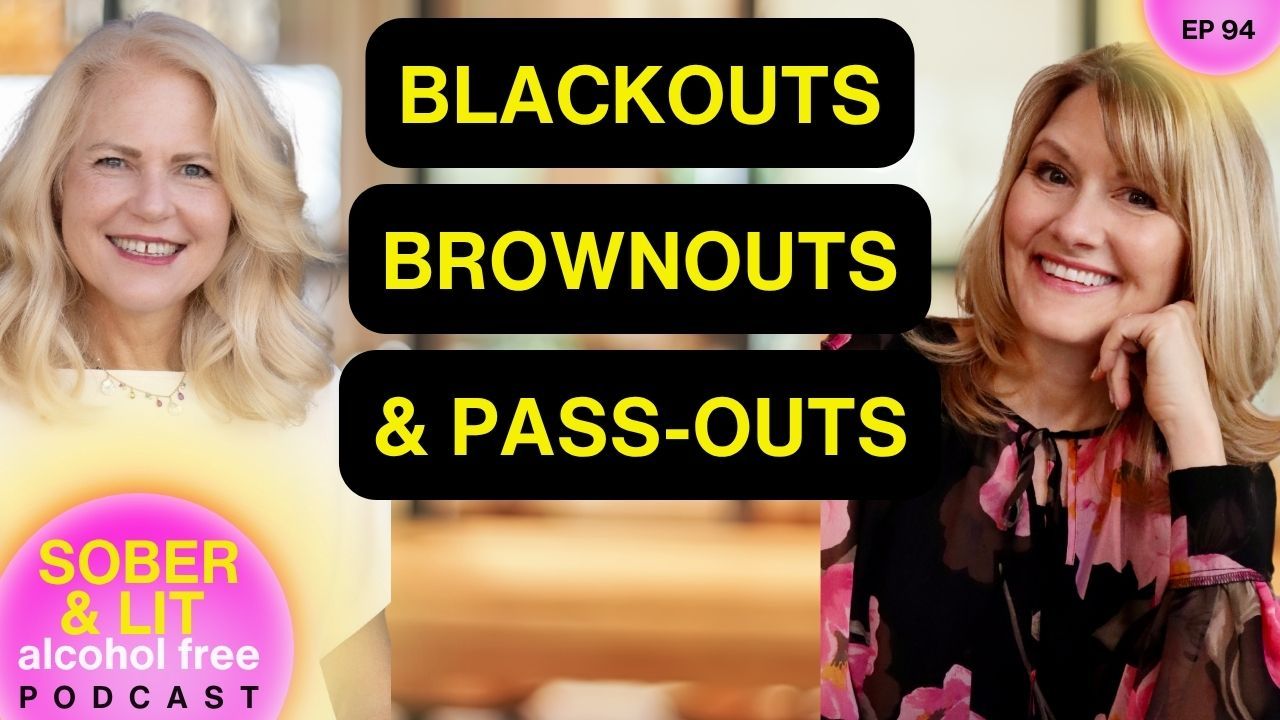Blackouts, Brownouts, and Pass-Outs / EP 94
Oct 28, 2025
Listen to the PODCAST Here
Watch the Podcast on YouTube Here

Exploring the Science, Personal Stories, and Risks Behind Blackouts, Brownouts, and Passing Out
When most people hear the word "blackout" associated with drinking, they might picture wild parties, reckless abandon, or simply drinking to excess. But as Ruby Williams and Susan Larkin discussed on Episode 94 of the Sober & Lit Podcast, blackouts are not about having too much fun or consuming one drink too many. Instead, a blackout is a neurological event—where alcohol temporarily shuts down the brain’s ability to create new memories.
Susan shared her own experiences, describing mornings when her husband would ask, "Do you remember what you said last night?"—and she genuinely did not. This lack of memory isn’t about selective recall; it’s about the brain being physically unable to record information. In layman’s terms, the hippocampus—a part of the brain responsible for memory formation—gets disrupted by alcohol, as Susan explained: “It turns off the recording device in your brain... it hit stop on the record button,” making it impossible to remember events from the blackout period.
Blackouts vs. Brownouts vs. Passing Out: What’s the Difference?
Ruby highlighted an important distinction: Not all lost time during drinking is the same. Passing out is straightforward—you lose consciousness and fall asleep, often as your body begins to process excess alcohol. Blackouts, on the other hand, mean you’re awake, active, and, to others, seem perfectly normal. You may be dancing, talking, ordering drinks, or even making significant decisions, all without ever forming memories of those actions. Ruby recounted a friend’s story: “Everybody thought she looked normal... but her brain is not making the memories.”
There’s a grey area, too—“brownouts”—where you remember segments of the night but not everything. For both Ruby and Susan, much of their drinking was alone or at home, muddying the waters between passing out, brownouts, and blackouts. But the consequences are real, from relationship damage to existential worries about lost time.
The Risks and Realities: Escalating Blackouts, Dangerous Situations, and Gaslighting
One of the most alarming aspects raised in the podcast is how blackouts can become more frequent and require less alcohol over time. Once you start to have some blackouts or brownouts, you are more susceptible to more and more of them with less and less amounts of alcohol. Ruby provided stories from the sober community, recounting individuals who, after a single drink, would wake up in jail or a stranger’s house, piecing together their night from others’ accounts.
The implications are severe, especially for women. As Ruby noted, “Blackouts can increase the risk of dangerous situations... accidents, assaults, impaired judgment.” And the resulting memory loss is permanent; there’s no way to retrieve these moments. Waking up with holes in your story can leave you vulnerable to manipulation, as depicted in the book and film *The Girl on the Train*, where the protagonist is gaslit by her ex-husband because she cannot recall her blacked-out actions.
Alcohol’s Lasting Impact on the Brain: Dementia, Memory Loss, and Neurological Damage
Beyond the immediate risks of blackouts, regular alcohol consumption hammers away at the brain’s health over time. Susan emphasized the science: “Alcohol... is like a sledgehammer to your brain.” Studies show decreased brain volume, changes in white matter, and increased risk for dementia and early-onset memory disorders in those with regular or heavy consumption—particularly those with blackout episodes. Referencing Dr. Amen’s research, Ruby described brain scans that reveal alcohol as literally “poking holes” in the brain.
This isn’t a moral failing or weakness; it’s pure neurobiology. Some people are more susceptible than others, and blackout drinking early on can be a sign of future alcohol use disorder. Understanding this can foster self-compassion and encourage individuals to seek help rather than shame.
Choosing Brain Health: Recovery, Healing, and Finding Real Fun
While all these facts may feel daunting, there is hope. Susan and Ruby championed the idea of neuroplasticity—our brain’s ability to heal and grow. Quitting alcohol, embracing healthy habits like meditation, creativity, and learning, can enhance recovery and memory. Ruby encouraged listeners to seek out real, restorative fun, such as art or engaging activities that foster a “flow state”—savoring life’s moments rather than missing them.
In the end, protecting your brain isn’t about being perfect; it’s about understanding what’s really happening, making informed choices, and showing yourself compassion. As they shared, “You are not broken and you are not alone... It’s not your fault. This is science.”
🧠 Let’s love our brains, cherish our memories, and make every moment count.
_______
Ruby Williams at Freedom Renegade Coaching https://www.freedomrenegadecoaching.com/
Follow Coach Ruby: @rubywilliamscoaching
Email: [email protected]
Grab your copy of our FREE WineFree Weekend Guide to help you on your alcohol free journey. https://www.freedomrenegadecoaching.com/WineFreeWeekend
